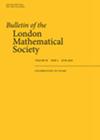Kazhdan-Lusztig多项式组合不变性的一个注记
IF 0.9
3区 数学
Q2 MATHEMATICS
引用次数: 0
摘要
我们引入了惊人的超立方分解及其双捷径的概念,并利用这些新思想,给出了包含对称群Kazhdan-Lusztig多项式的组合不变性猜想的一个猜想。这个猜想在本质上具有组合的优点。Barkley和Gaetz在附录中讨论了双超立方体的相关概念,并证明了它们在共初等区间中的一个类似猜想。本文章由计算机程序翻译,如有差异,请以英文原文为准。



A note on combinatorial invariance of Kazhdan–Lusztig polynomials
We introduce the concepts of an amazing hypercube decomposition and a double shortcut for it, and use these new ideas to formulate a conjecture implying the combinatorial invariance conjecture for the Kazhdan–Lusztig polynomials of the symmetric group. This conjecture has the advantage of being combinatorial in nature. The appendix by Barkley and Gaetz discusses the related notion of double hypercubes and proves an analogous conjecture for these in the case of co-elementary intervals.
求助全文
通过发布文献求助,成功后即可免费获取论文全文。
去求助
来源期刊
CiteScore
1.90
自引率
0.00%
发文量
198
审稿时长
4-8 weeks
期刊介绍:
Published by Oxford University Press prior to January 2017: http://blms.oxfordjournals.org/

 求助内容:
求助内容: 应助结果提醒方式:
应助结果提醒方式:


